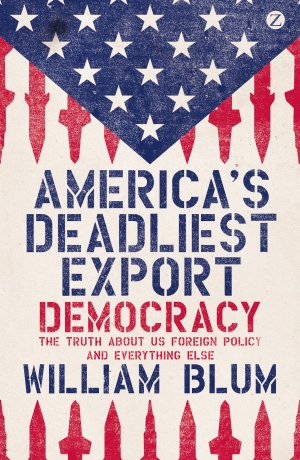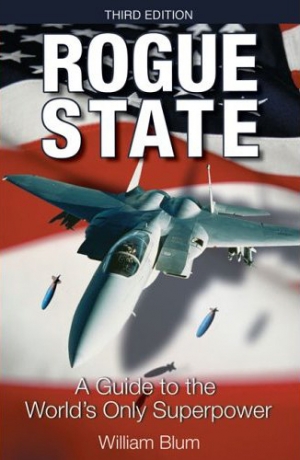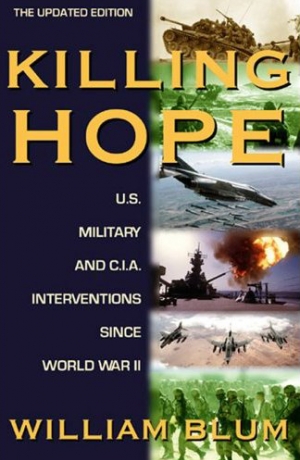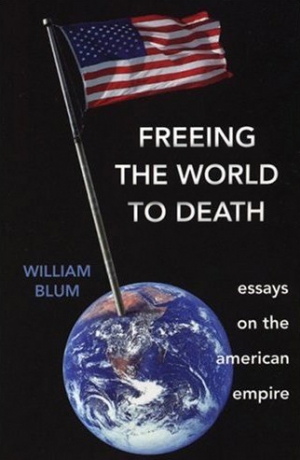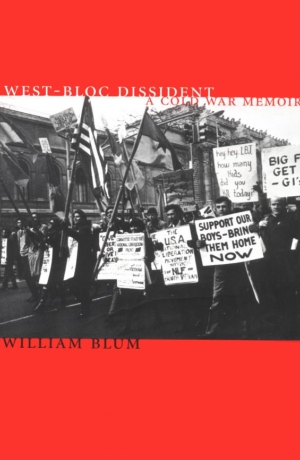The Anti-Empire Report #14
By William Blum – Published October 24th, 2004
The CIA should wear a ski mask when they use this excuse
Time Magazine reported that the Bush administration had a plan to use the CIA to funnel money to candidates it favored in the forthcoming Iraqi elections. The rationale given was that Iran was probably bankrolling its own preferred candidate. 1 Whether Iran has actually been engaged in such I do not know, but what is certain is that it is irrelevant to American policy. The United States has been trying to fix elections in every corner of the world for more than half a century without any other foreign power being in the picture at all. This argument in the case of Iraq is reminiscent of the Cold War period in Western Europe, when the CIA was covertly financing many political parties, media, labor unions, student groups, women’s organizations, etc. When this secret support began to be disclosed in the 1960s, supporters of the CIA would typically defend the Agency’s sundry activities in Europe on the grounds that the Russians were the first to be so engaged there and had to be countered. But it should be borne in mind that all the different types of enterprises and institutions supported by the CIA in Western Europe were supported by the Agency all over the Third World for decades on a routine basis without a Russian counterpart in sight.
The Fear factor
For months now we’ve been bombarded with government warnings about possible terrorist attacks to disrupt the November elections. All manner of precautions and safeguards have been instituted by federal and state authorities. The Library of Congress has prepared a report entitled: “Postponement and Rescheduling of Elections to Federal Office. 2
But hardly a thought is expressed about the question of “Why would terrorists want to disrupt the American elections?” George W. would answer that it’s because terrorists hate and envy democracy. (Thank you George, now take your pill.) The Department of Homeland Security has raised the analogy with Spain, where last March terrorists bombed several trains, killing many people, just days before a national election. But that was to influence the vote, to turn the Spanish public away from the government which was a strong supporter of the US war in Iraq, and the bombings did indeed result in the opposition party, which was very much against the war, taking power. But in the United States there’s no such opposition party with even a remote chance of winning the election. The Democratic candidate expresses 100 percent support of the war. So who would benefit from a terrorist attack on the elections, or the threat of same, the fear factor? Bush’s lead in the polls, we’ve been told repeatedly, comes mainly from people who think he’s better with national security issues.
Flu vaccine shortage
The shortage, we are told, is due to the bacterial contamination of a major part of the vaccine supply. Turns out the bacteria is Serratia marcescens. This is the same microorganism the US Army sprayed in the open air in the San Francisco Bay area in the 1950s and 60s, causing multiple illnesses and at least one death. During that period and afterward, when the many spraying operations – which used various microorganisms throughout the United States – were publicized, the response of the Pentagon was that all the microorganisms they were using were harmless and that any illnesses and deaths were not related to the sprayings. Now we’re told in effect that Serratia marcescens can indeed be harmful. But this should not be news. As the assistant to the director of the Centers for Disease Control and Prevention testified before the Senate in 1977: “There is no such thing as a microorganism that cannot cause trouble. If you get the right concentration at the right place, at the right time, and in the right person, something is going to happen.” 3 Today, if anyone other than the US government did what the Army did back then they would be called bioterrorists.
More of what many of you don’t want to hear
Each month I think I’m going to stop beating up on Kerry and the Democrats because it makes me sad myself to think that there’s no honorable and viable alternative to Emperor George or the Republicans. Then I read about the Democrat’s rising star, Barack Obama, Senate candidate and almost certain winner in Illinois, keynote speaker at the Democratic National Convention. He declared that he would favor the use of missile strikes against Iran if it failed to bow to Washington’s demand that it cease its alleged nuclear weapons program. Obama also said that in the event of a coup that removed the Musharraf regime in Pakistan, the US should attack that nation’s nuclear arsenal. 4 Very nice, Barack. Just what this violence-plagued, tired old world needs, more death and destruction, more Iraqs and Afghanistans, more pre-emptive wars of aggression, more imperial arrogance. Obama is clearly showing that he’s presidential material by meeting the first requirement for that office: no inhibitions about killing large numbers of innocent and defenseless foreign people. Oh yes, he said the missile strikes against Iran would be “surgical”. Even as I write this, the cemeteries of Fallujah are filling up with cases of surgical malpractice.
Democrats Anonymous
Much has been made of Bush’s inability to admit to an error. But what if he admitted that Iraq was a big mistake? Would that not also implicate Kerry for supporting such a mistake? Kerry has stated that he would have supported the war even if he had known beforehand everything we now know about how it’s turning out.
A reader, Barbara West, writes: “For years I have had the idea of outlining a 12-step program called Democrats Anonymous, for those who know they should abandon that dead-end, but just can’t bring themselves to, even when their political lives have become unmanageable. The concept is yours if you can make something of it.” I in turn make the same offer to any other reader.
“Foreign fighters” in Iraq
Ever since the insurgency began in Iraq, the United States has tried to emphasize the presence of “foreign fighters” amongst the insurgents in an attempt to play down the notion of the people of Iraq rising up in resistance to their occupiers, so reminiscent of the Second World War European resistance fighters rebelling against their Nazi occupiers. But the United States has had many more “foreign fighters” at their side than do the Iraqi insurgents – from Australia, Britain, Poland, El Salvador, and a number of other countries, not to mention the largest contingent of foreign fighters in Iraq, from the United States. Why shouldn’t the Iraqi insurgents have the same right?
Brainwashed commies revisited
Back in May I wrote in this report: George W. Bush, speaking in October 2003 after many resistance attacks in Iraq: “The more successful we are on the ground, the more these killers will react.” 5
Gen. Richard B. Myers, chairman of the Joint Chiefs of Staff, speaking in April 2004, depicted the insurrection and fighting that had risen over nearly a two-week period in an equally positive light. “‘I would characterize what we’re seeing right now as a – as more a symptom of the success that we’re having here in Iraq,’ he said … explaining that the violence indicated there was something to fight against – American progress in building up Iraq.” 6
Imagine that in the 1980s Russian leaders had used identical logic and language about how their war against the Afghanistan insurgents was going for them. The American media would have had a field day of snide remarks about those poor brainwashed, Orwellian commies.
And now, to add to the historical/hysterical record here is the Washington-approved, unelected Iraqi prime minister and former CIA asset, Ayad Allawi, declaring last month that although the insurgency is “still raging”, it’s a good sign – a sign that “it’s not getting stronger, it’s getting more desperate.” 7
Who’s missing?
Shortly after 9-11, the State Department began to maintain a list on its website: “Countries where al Qaeda has operated”. When I looked at it on Sept. 21, 2004, there were 45 names on the list, including the United States. But not Iraq or Syria, nor North Korea or Cuba. 8
It’s now gone, or at least not at that URL. Anyone who’d like to see the list as it was on Sept. 21, can email me.
Memo to George W and John Ashcroft
On the 4th day of November 1796, a “Treaty of peace and friendship between the United States of America and the Bey and subjects of Tripoli, of Barbary” was concluded at Tripoli [Libya]. Article 11 of the treaty begins: “As the government of the United States of America is not in any sense founded on the Christian Religion … “
It should be further noted that Article VI, Section II, of the United States Constitution states: “This Constitution, and the Laws of the United States which shall be made in Pursuance thereof; and all Treaties made, or which shall be made, under the Authority of the United States, shall be the supreme Law of the Land; and the Judges in every State shall be bound thereby, any Thing in the Constitution or Laws of any State to the Contrary notwithstanding.”
Hitler comparisons
There’s something called “Godwin’s Law” floating around the Internet, particularly in Usenet groups. The law states that whenever one person in an argument makes a comparison to Hitler or the Nazis, that’s the end of the argument and that person is regarded as having lost it. But not to worry; a related rule, “Gabriel’s assertion”, states: “Godwin’s Law can not be used to silence criticisms of modern governments which begin to behave like Nazis.”
Given that, here’s Hitler on his plans to attack Poland with the pretext of German soldiers in Polish uniforms attacking Germany: “Whether the world believes it doesn’t mean a damn to me. The world believes only in success.” 9
Like on many other occasions, the man was very insightful. If the US invasion and occupation of Iraq had gone just the way the Bush administration predicted, with no resistance from the Iraqi people, the operation would have been applauded almost universally despite the multiple lies, the flagrant violations of international law, and the death and destruction from the initial bombing campaign.
And as an additional memo to Bush and Ashcroft, here’s another of Adolf’s thoughts: “Secular schools can never be tolerated because such schools have no religious instruction, and a general moral instruction without a religious foundation is built on air; consequently, all character training and religion must be derived from faith … we need believing people.” 10
A look back at the Cold War
Last month the latest volume of the State Department’s historical series, “Foreign Relations of the United States” (FRUS), was released; this volume covers 1964-1968 and deals in part with Bolivia. It states that a CIA document of that period characterized the overall goals of the U.S. Government’s covert action programs in Bolivia as follows:
“The basic covert action goals in Bolivia are to foster democratic solutions to critical social, economic, and political problems; to check Communist and Cuban subversion; to encourage a stable government favorably inclined toward the United States; and to encourage Bolivian participation in the Alliance for Progress. The main direction and emphasis of CA [covert action] operations is to force Communists, leftists, and pro-Castroites out of influential positions in government, and to try to break Communist and ultra-leftist control over certain trade union, student groups, and campesino organizations.”
This is classic coldwarspeak, a good example of the rationalizations put forth by US officials for numerous American interventions throughout the world during the Cold War. The following should be noted:
US covert actions into virtually all the important aspects of Bolivian life is said to “foster democratic solutions”. But even if one were to accept the odd premise that the United States was a legitimate participant in Bolivia’s democratic process, the masses of Bolivians could not begin to match the CIA input into that process in terms of money, media control, bribery of government officials high and low, or alliances with the police and armed forces.
“To encourage a stable government favorably inclined toward the United States” is virtually a redundancy inasmuch as the United States has long tended to equate “stability” with being “pro-American”; conversely, the tendency has been to view governments not in love with US foreign policy as “unstable”, and in need of regime change.
“Communists, leftists, and pro-Castroites”, an unknowing person might conclude, are not Bolivians with a right to work in the country’s government.
Nor, apparently, do communists and “ultra-leftists” have a right to important positions in non-government organizations. (Ironically, this is a tacit admission that communists are not the furthest left on the political spectrum, an idea that most Americans, even today, would find surprising.)
The new FRUS volume also notes that “When he took office in November 1963 President Johnson inherited a longstanding U.S. Government policy of providing financial support for Bolivian political leaders.”
Thus, the United States helped to determine who ran the society, and how it was to be run, and they called that “democracy”.
And remember, the above document represents what CIA personnel were telling each other and, presumably, other government officials. Is it any wonder that what such people actually tell the American people can be such crap? The words of Enoch Powell, the former conservative gadfly in Parliament, apply to Americans as well as to his English colleagues:
“There is a factor in human affairs more dangerous and destructive than the nuclear weapon. It is the factor of humbug. Particularly is that factor to be dreaded where the English are dealing with other nations, because the English are the world’s past masters in the art of humbug, having developed it over centuries as a device for regulating their own internal affairs with the minimum of friction and the maximum of self-congratulation. The trouble begins when others, and even they themselves, fall into the trap of taking the humbug seriously.”
The conspiracy to trivialize conspiracy theories
Pierre Salinger, press secretary to presidents Kennedy and Johnson, died October 16. The Washington Post obituary included this: “His journalistic reputation was besmirched in the 1990s, however, after his insistence that two major airline crashes were not what they seemed. He said that the 1988 explosion of Pan Am Flight 103 over Lockerbie, Scotland was a Drug Enforcement Agency operation that went wrong – a theory for which no evidence materialized.” 11
I quote this as an example of how the mainstream media deals with “conspiracy theories”. When the incident in question first occurs, the “official” government explanation crowds the headlines and ignores the alternative explanations; the latter are confined to the alternative media, except when the mainstream media, for whatever reason, is obliged to make note of an alternative explanation; then it is dismissed without serious consideration, if not openly ridiculed. After a few years of this, in the minds of the vast majority of people the official explanation is all that exists. Then, when the mainstream media is obliged to make reference to an alternative explanation, it usually refers to it as having been “discredited”, or, as in this obituary, lacking evidence. In the case of Pan Am 103, what the reader is not informed of is that no evidence has materialized in support of the official theory, that a Libyan government agent planted the bomb. There is, in fact, much more evidence in support of the DEA role (but primarily that of Iran) than of the Libyan role. 12
“Conspiracy” researcher and author Jonathan Vankin has observed: “Journalists like to think of themselves as a skeptical lot. This is a flawed self-image. The thickest pack of American journalists are all too credulous when dealing with government officials, technical experts, and other official sources. They save their vaunted “skepticism” for ideas that feel unfamiliar to them. Conspiracy theories are treated with the most rigorous skepticism.
“Conspiracy theories should be approached skeptically. But there’s no fairness. Skepticism should apply equally to official and unofficial information.” 13
Notes
- Time Magazine, October 4, 2004
- October 4, 2004, http://www.fas.org/sgp/crs/RL32623.pdf
- For this testimony and more about the Army spraying, see William Blum, “Rogue State: A Guide to the World’s Only Superpower”, chapter 15
- Chicago Tribune, September 25, 2004
- Washington Post, October 28, 2003, p.1
- New York Times, April 16, 2004
- Washington Post, September 21, 2004
- The list was at: http://usinfo.state.gov/products/pubs/terrornet/12.htm
- New York Times, November 24, 1945, p.7, from a found Nazi document.
- April 26, 1933, from a speech made during negotiations leading to the Nazi-Vatican Concordant
- Washington Post, October 17, 2004, p.C10
- See Blum’s essay “The Bombing of PanAm Flight 103: Case Not Closed”
- Jonathan Vankin, “Conspiracies, Cover-ups and Crimes: Political Manipulation and Mind Control in America” (1991), p.120
Any part of this report may be disseminated without permission, provided attribution to William Blum as author and a link to williamblum.org is provided.
